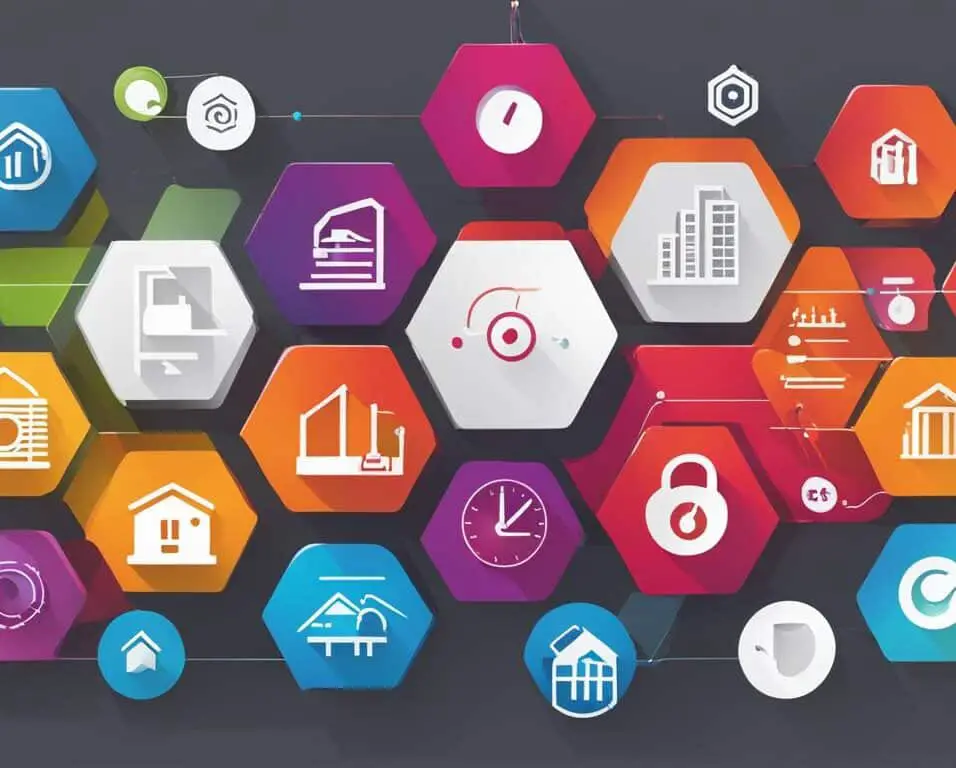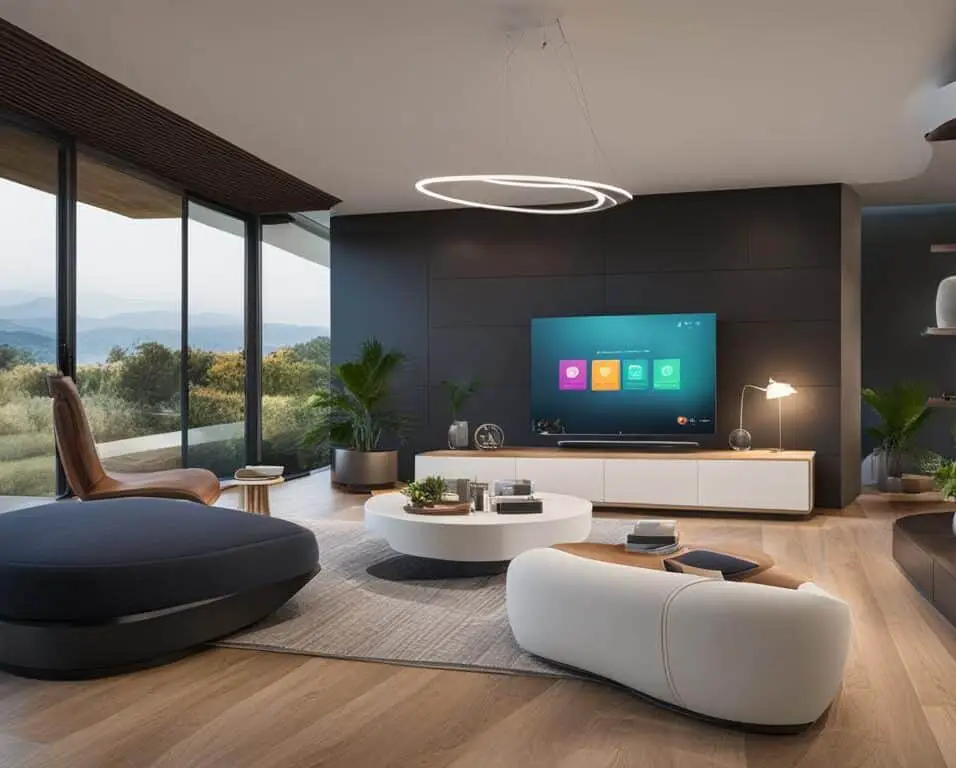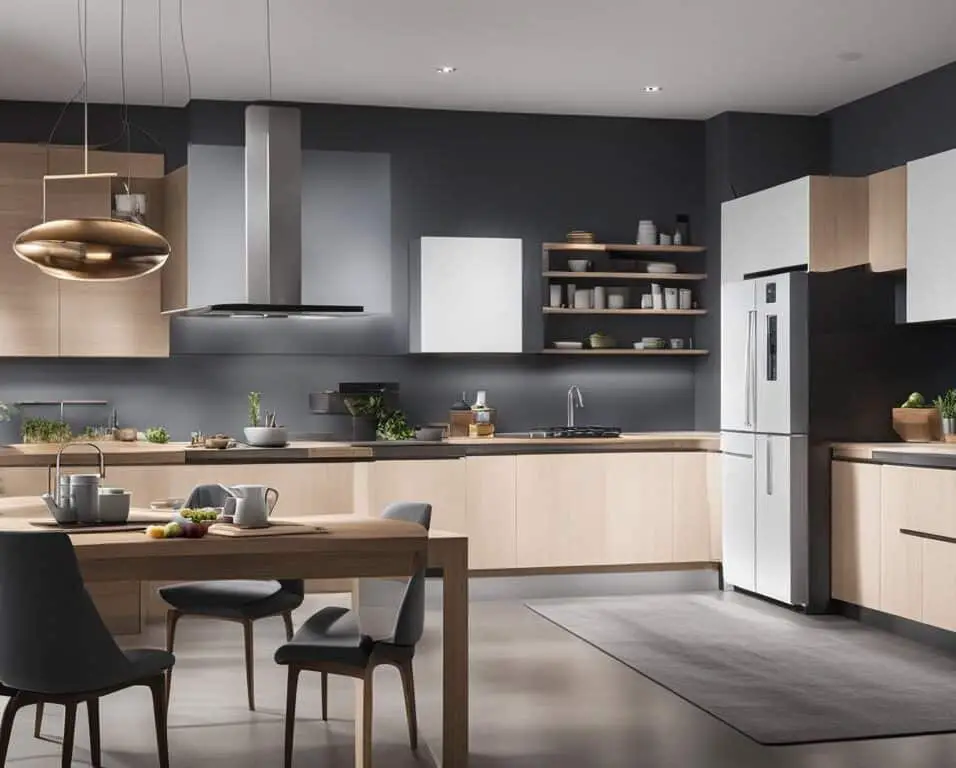AI: The Game Changer in Home Automation
Smart Home Automation is a rapidly growing industry, and with the integration of Artificial Intelligence (AI), it has reached new heights. AI algorithms have transformed the way smart homes operate, revolutionizing convenience, security, and energy efficiency.
The integration of AI brings a whole new level of intelligence to smart home technology. Devices now have the ability to learn and adapt to homeowner preferences, making them more efficient and user-friendly. Whether it’s adjusting the lighting, controlling the temperature, or even anticipating your needs, AI-driven smart devices have become indispensable in our modern lifestyle.
Imagine coming home to a house that has already adjusted the temperature to your liking, turned on the lights, and started playing your favorite music – all without you having to lift a finger. With AI integration, this is no longer just a dream, but a reality.
Key Takeaways
- AI integration has revolutionized smart home technology, enhancing convenience, security, and energy efficiency
- AI-driven devices learn and adapt to homeowner preferences, making them more efficient and user-friendly
- Voice-controlled virtual assistants like Amazon’s Alexa and Google Assistant enhance convenience and comfort in smart homes
- AI-powered security cameras reduce false alarms and provide intelligent surveillance for enhanced home security
- The future of AI in smart home technology promises even more advanced and seamless integration into our daily lives
Understanding Smart Homes and AI Integration
Smart homes have transformed the way we live by incorporating connected devices and systems that can be controlled remotely through smartphones or voice commands. With the integration of Artificial Intelligence (AI), these devices have become even more intelligent and user-friendly.
AI algorithms enable devices like smart thermostats, lighting systems, security cameras, and appliances to learn and adapt to homeowner habits and preferences. This adaptability allows these devices to operate more efficiently and cater to the specific needs of the homeowners.
For instance, a smart thermostat with AI capabilities can learn when to adjust the temperature and create a personalized heating and cooling schedule, optimizing energy usage and creating a comfortable environment.
AI integration not only enhances the efficiency and comfort of smart homes but also offers convenience. Homeowners can control various devices using simple voice commands. It’s as easy as saying, “Turn off the lights” or “Start the coffee machine.” The seamless integration of AI into smart home technology provides a new level of convenience that streamlines daily tasks and makes life easier.
Furthermore, AI-driven smart home systems can automate routine tasks and personalize the living experience. From adjusting the lighting to match your mood to playing your favorite music when you walk through the door, AI-powered smart homes can create a personalized atmosphere that caters to your preferences.
AI integration in smart homes not only enhances convenience and comfort but also contributes to energy efficiency and cost savings. By learning your habits and optimizing energy usage, AI-powered smart home devices can help reduce energy consumption and lower utility bills.
With AI integration, smart homes have become intuitive, personalized, and efficient living spaces. The seamless integration of AI technology into smart home devices has revolutionized the way we interact with our homes, making our lives more convenient, comfortable, and energy-efficient.
Enhanced Convenience and Comfort
One of the primary advantages of AI in smart homes is the enhanced convenience and comfort it brings to homeowners. Voice-controlled virtual assistants like Amazon’s Alexa and Google Assistant allow users to control various devices with simple voice commands. These virtual assistants can adjust lighting, play music, provide weather forecasts, and perform various tasks without requiring physical interaction. AI-powered smart speakers can understand natural language and engage in conversations, making interactions more human-like and intuitive. This level of convenience simplifies daily tasks and enhances the overall living experience in smart homes.
| Enhanced Convenience | Comfort | Smart Home Automation |
|---|---|---|
| Control devices through voice commands | Personalized lighting, temperature, and entertainment | Virtual assistants simplify tasks |
| Adjust lighting and music remotely | Optimized living environment | Intuitive interactions |
| Weather forecasts | Streamlined daily routines | Improved convenience |
An AI-powered smart home provides homeowners with a level of convenience that was previously unimaginable. Imagine entering your home and effortlessly adjusting the lighting, temperature, and even playing your favorite music, all with a simple voice command. With smart home automation, mundane tasks can be automated, allowing you to focus on what truly matters–relaxing and enjoying the comfort of your own home.

Having the ability to interact with your smart home using voice commands adds a whole new layer of convenience. Whether you want to dim the lights for a movie night or switch on the air conditioning on a hot summer day, virtual assistants like Alexa and Google Assistant make it effortless. The comfort of controlling your home with just your voice is truly something to be experienced.
Improved Security
AI integration in smart home technology has significantly improved the security features, making homes safer and more secure. By harnessing the power of AI, smart homes are equipped with advanced security systems that provide homeowners with peace of mind and effective protection against threats.
AI-powered security cameras are at the forefront of enhancing home security. These intelligent cameras have the ability to accurately distinguish between intruders and harmless movements, reducing false alarms. Homeowners can trust that they will only be alerted when there is a genuine security threat.
AI algorithms analyze patterns of activity within the home, such as the opening and closing of doors, to detect any unusual behavior. This intelligent surveillance system allows homeowners to receive timely alerts and take appropriate action, ensuring the safety of their property and loved ones.
Intelligent Surveillance and Peace of Mind
With AI integration, smart homes provide homeowners with a level of intelligent surveillance that goes beyond traditional security systems. These advanced systems have the capability to:
- Identify and distinguish between different individuals, ensuring efficient access control.
- Monitor and track suspicious activities, providing real-time updates to homeowners.
- Generate detailed reports and analytics on security events, allowing for informed decision-making.
This level of intelligent surveillance enables homeowners to have peace of mind, knowing that their property is well-protected and that any security incidents will be detected and addressed promptly.
Benefits of AI Integration in Smart Home Security
| Benefit | Description |
|---|---|
| Reduced false alarms | AI-powered security cameras can distinguish between intruders and harmless movements, minimizing false alarms and ensuring accurate threat detection. |
| Timely alerts | AI algorithms analyze patterns of activity within the home and send real-time alerts to homeowners in the event of any unusual behavior. |
| Intelligent surveillance | AI-powered security systems provide advanced surveillance capabilities, including efficient access control, monitoring of suspicious activities, and detailed reporting. |

Conclusion
The integration of AI into smart home technology has revolutionized everyday living, bringing enhanced convenience, security, and energy efficiency to homeowners. With AI-driven devices that learn and adapt to user preferences, smart homes have become more efficient and user-friendly. However, there are still concerns about privacy and the use of personal data by AI systems.
Despite these challenges, the future outlook for AI in the smart home technology market is promising. We can anticipate the development of even more sophisticated and intelligent devices that seamlessly integrate into our daily lives. As AI technology continues to advance, consumers are increasingly recognizing the value of AI-driven smart home solutions.
As a result, the market for AI in smart home technology is expected to see further growth and innovation. Smart homes powered by AI will continue to shape the future of home automation and technology trends, transforming the way we live and interact with our living spaces. With ongoing advancements in AI technology, we can look forward to a future where smart homes become an integral part of our daily routines, providing us with increased comfort, security, and energy efficiency.
FAQ
How does AI integration revolutionize smart home technology?
AI integration into smart home technology enhances convenience, security, and energy efficiency. AI algorithms enable smart devices to learn and adapt to homeowner preferences, making them more efficient and user-friendly.
What are the benefits of AI integration in smart homes?
AI integration in smart homes offers enhanced convenience and comfort. Voice-controlled virtual assistants like Amazon’s Alexa and Google Assistant allow users to control various devices with simple voice commands.
How does AI improve security features in smart homes?
AI-powered security cameras can distinguish between intruders and harmless movements, reducing false alarms and ensuring that homeowners are alerted only when there is a genuine security threat. AI algorithms can analyze patterns of activity within the home and alert homeowners to any unusual behavior.
What are the privacy concerns associated with AI integration in smart homes?
Privacy concerns regarding the collection and use of personal data by AI systems remain a significant challenge in smart homes. However, advancements in AI technology aim to address these concerns and prioritize data protection.
What does the future hold for AI in smart home technology?
The future of AI in the smart home technology market appears promising, with the potential for even more sophisticated and intelligent devices that seamlessly integrate into our daily lives. AI-driven smart home solutions will continue to evolve and shape the future of home automation.








